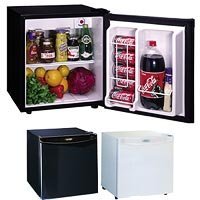No dorm room is complete without a fridge to stack all of the snacks and late-night brain food it can hold. There’s no greater feeling after a long day of studying than opening up your fridge and finding cold refreshments and food for your consuming pleasure.
One of the first things to remember when purchasing a fridge is to make sure it is as compact as possible while still allowing you to fit everything you need inside. You want to conserve space while at the same time have a fridge that is useful and meets your individual needs. Also, keep in mind that these fridges will end up saving you money in the long haul since students can stack up on milk, soda, and of course, beer. All of these items are more expensive when purchased individually and buying in bulk will save quite a bit of money in the long haul.

Below we will explore some tips that will allow you to weed through the large selection of compact fridges available on the market today.
Recommended Resources:
- Cost
Mini Refrigerators vary greatly in price so it is important to decide how much use the fridge is going to get when allocating your budget. Mini Refrigerators cost anywhere from $50 to $1,000 for the higher-end fully loaded models. If you plan on eating out most of the time or have a meal plan set up, then you probably wont need a very expensive fridge and you will do just fine with a lower end model. On the other hand, if you plan on cooking most of your meals, then a higher-end refrigerator might be a better investment. - Features
Take note of the many different features a mini fridge might have and then make a list of those that are most important to you. Some of the most common features in a mini fridge include: large freezers, ice shelf with ice trays, automatic defrosters or frost-free designs, can racks or vertical can dispensers, stainless steel or satin black exteriors, gallon door storage, spill resistant shelves, tops that can double as a counter top, vegetable crispers, and reversible door hinges. - Size
Mini-Refrigerators range from 1.7 cubic feet to about 6.0 cubic feet. It is important for you to consider how big your room is, how much of it you want to use for the fridge, and the amount of money you are trying to spend on the fridge. A good rule of thumb is to purchase the smallest fridge you can while still accommodating all of the food and drinks you deem necessary. - Energy Saving
If possible, buy an Energy Star efficient mini-fridge. They are clearly marked with the Energy Star label. These fridges will help you minimize energy costs. Also, make sure you keep your fridge away from direct sunlight and keep the door closed at all times for maximum energy saving.
Keep these tips in mind when purchasing your dorm room refrigerator and you will be well on your way to getting the most bang for your buck while enjoying the multiple benefits that come with owning a mini-fridge.